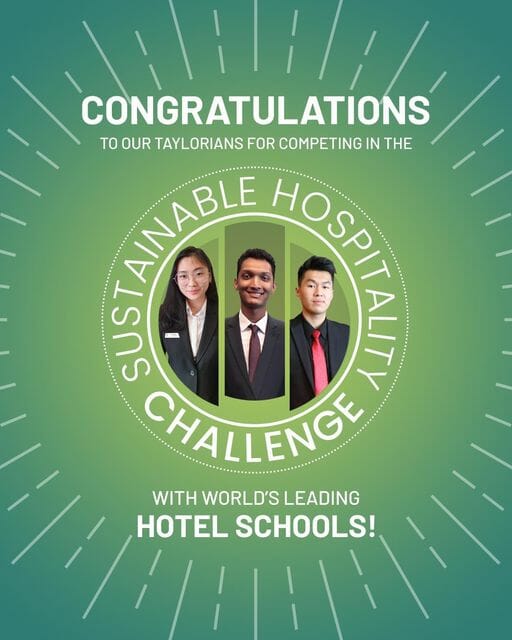Participating in the globally acclaimed Sustainable Hospitality Challenge (SHC) is no small feat but these three students from Taylor’s School of Hospitality, Tourism and Events (TSHTE) won a semi-final award in the Hospitality of Tomorrow: Dimension 3 Category against the best hospitality schools all over the world in the industry.
Invited to participate in this online competition by their friends and organisers at the Hotelschool The Hague in the Netherlands, the students needed the right advice from their lecturers and mentors, and were then guided to Taylor’s Me.reka Space, says Dr Ruth Sabina Francis, Programme Director of Taylor’s SHTE.
“The students were excited about the whole idea of food waste being recycled to make new products like fertilisers and toiletries, that was why I suggested they get more guidance from Taylor’s Me.reka Makerspace,” she adds.
Taylor’s Me.reka Makerspace provides students with a wider scope of expertise based on the experience of experts, including design, fabrication, electronics, engineering, business, community and such.
“They provided these kinds of insights for the Ecoville project and we are proud of their success and creativity,” she says.
Taylor’s winning students in hospitality, Angeline Wibawa, Kevin Leonardo and Namiq Rameez impressively developed a sustainable resort plan called ‘Ecoville’ for an industry that is known to have a large negative impact on the environment with its high consumption of power and resources.
Their idea essentially creates a circular economy within their business model, where they are able to supply and recycle items back to the industry, says William Koong, Co-Director, Taylor’s Me.reka Makerspace.
“The Ecoville idea was developed by the amazing students at the School of Hospitality, Tourisms and Events. Their idea to produce new items from the food waste was a stroke of genius. Food waste like scraps from the preparation of food and leftovers from meals are usually disposed of in the trash can. People do not see the value in rotten food but these students did. They are able to see that this “garbage” can be processed to make different things – composted and made into high nutrient fertilizer for the farming industry; and even selling the raw materials that can be made into household products like toiletries,” he says.
Finding innovative solutions towards a more sustainable future has been the buzz phrase in almost every industry in the world, ever since the pandemic hit in 2020. The hospitality and tourism industry, having been hit the most, is being challenged to transform towards digital and sustainable solutions even more so now.
The SHC, established and launched in 2014 as a platform that challenges innovative hospitality approaches for the last six years, is empowering future generations of hospitality professionals who are currently in the academia world to further push the boundaries of innovation and to create value-added solutions. Started by the Hotel School Hague, it has evolved into a global knowledge-based initiative, empowering the next generation to find sustainable solutions in the industry. These solutions will in turn contribute to the larger vision of a sustainable world and hospitality landscape supported by like-minded sustainability-driven corporate organisations seeking to bring the new ideas to life in a meaningful and impactful way.
This year, 31 universities attended SHC 2020, including Taylor’s University. The student experience is spreading globally, creating quite a buzz in the industry.
The Challenge was held on a virtual platform with 5 juries and contestants from Ecole hôtelière de Lausanne, Griffith University, EUHT StPol, Hong Kong Poytechnic, and Cornell University who also won places in the competition.









